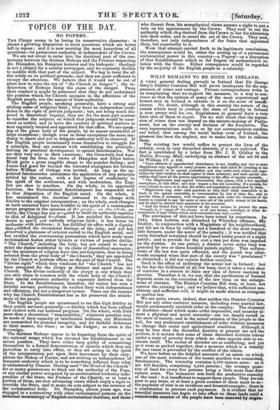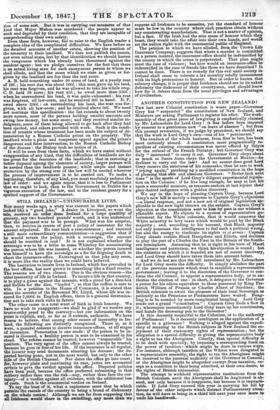WHAT REMAINS TO BE DONE IN IRELAND.
A VERY general feeling prevails in Ireland that Sir George Grey's District Coercion Bill will prove inadequate for the sup- pression of crime and outrage. Private correspondents write to us complaining that we support the measure, in a way to con- vince us that the opinion of many of the most experienced and honest men in Ireland is adverse to it on the score of insuffi- ciency. No doubt, although in this country the nature of the causes which tend to produce the state of anarchy in Ireland is now pretty well kn,.wn, Englishmen in general have a very faint idea of them in degree. Yet we still think that the repres- sion of crime does not depend on the statute-making of Parlia- ment, but on the energy and decision of the Executive. The very representations made to us by our correspondents confirm our belief, that among the social lathes even of Ireland, the grossest has been the neglect, not to make laws, but to enforce them.
The existing law would suffice to protect the lives of the orderly, even in very disturbed districts, f it were enforced. The fact is established by a letter from Mr. J. R. Godley to the Dublin Evening Mail, embodying an abstract of the act 2d and 3d William IV. c. 108.
" Upon affidavit of apprehended disturbance in any locality, any two or more Magistrates may appoint so many persons as they shall think fit (residing in the neighbourhood) to be special constables, and may make such orders and regu- lations for their conduct as shall appear to them necessary; and such special con- stables shall have all the powers appertaining to the office of regular constable.
" The Magistrates may appoint whomsoever they please, with a few specified exemptions, to this office; and may impose a fine not exceeding five pounds, for every refusal to serve or to obey the orders and regulations established by them. "Magistrates may order such payment as they shall think reasonable to be made to the special constables, as remuneration for loss of time, &c., and to provide them, if necessary, with weapons: upon such order the treasurer of the county is required to pay the same at once out of the public money in his hands, and he shall be allowed such payments in his accounts.
"And the Grand Jury is required at the next assizes to present the sums to .1— mired off the "aunty. or off any barony, townlaud, or other de- nomination of land within which such constables may nave eerveti' The provisions of this act have been tested by experience. In 1845, when Leitrim was disturbed by Whiteboy offences, Mr. Godley, in conjunction with a Magistrate of his neighbourhood, put the act in force by calling out a hundred of the most respect- able farmers, under the screw of the penalty ; it was notified that every disturbed townland should be placed under guard of a night patrol ; and to provide for the cost a rate per diem was imposed on the district. At one period, a district seven miles long was guarded by two or three hundred patrols nightly. This enforce- ment of the law was quite effectual, and the parish was after- wards excepted when that part of the county was "proclaimed" as disturbed ; it did not require further coercion. Such is the effect of enforcing the actual law in Ireland : but so lax has the fulfilment of all law been, that it takes a vast show of coercion in a statute to raise any idea of future coercion in practice. Therefore is it, we say, that the pacification of Ireland depends more on the execution of the law than on the enlarge- ment of statutes. The District Coercion Bill does, at least, not narrow the existing law • and we believe that, with sufficient ma- chinery and sufficient will, it might be made almost as stringent as martial law.
We are quite aware, indeed, that neither the District Coercion
Bill nor any other coercive measure, including even martial law, would permanently establish order in the country. The elements of disorder—those which make order impossible' and anarchy al- most a physical and moral necessity—are too deeply rooted in the state of society, and in the actual relation of the people to the soil, for any permanent establishment of order without measures to change that social and agricultural condition. Although it may be true that the disturbed districts at present are not the poorest, it is certain that some of those disturbed districts labour under a state of poverty from which no class appears able to ex- tricate itself. The causes of disorder are so conflicting, and yet as it were so packed together, that a measure which is a remedy for one cause is prevented by the conflict of the others.
We have before us the detailed accounts of an estate on which
one of the most notorious of the recent murders was committed, Strokestown. The township contains 2,105 statute acres : on it are 479 families, comprising 2,444 persons ; the average quan- tity of land for every five persons being a little more than four statute acres. The statement sets forth the productive capacity of the land : it is insufficient to support these people. They are too poor to pay rents, or at least a great number of them must be so the payment of rent is an invidious and detested example; there is a combination to prevent such payments. It is evident that no remedial measures can begin to take effect on these lands until a considerable number of the people have been removed by migra.t
tion of some sort. But it was in carrying out measures of that kind that Major Mahon was murdered: the people appear so sunk and degraded by their condition, that they are incapable of comprehending their own safety.
Even these facts, however, fail to raise to the English reader a complete idea of the complicated difficulties. We have before us the detailed accounts of another estate, showing the position of the tenantry to their landlord. We dare not publish the names, nor even actual sums, lest by that identification we should hasten the vengeance which has already been threatened against the resident agent: but we pledge ourselves for the fact that there is an actual living man for each anonymous person to whom we shall allude, and that the sums which we state as given or for- given by the landlord are less than the real sums. A. B. held something under 30 acres of land, at a yearly rent of 19/. ; his rent due was about 1601.: this man gave up his land, his rent was forgiven, and he was allowed to take his whole crop. C. D. held 18 acres; his rent 451.; he owed more than 2501.: when he surrendered his land, it was quite exhausted : his rent was forgiven, all law-costs, and be received 501. in hand. E. F. owed above 2501.: on surrendering his land, the rent was for- given, with all law-costs ; and he received above 501. We need not continue this specification: the list extends to about twenty more names, most of the persons holding smaller amounts and owing less money, but some more; and they received similar in- dulgence, some of them being allowed to go back after they had been ejected, and others provided with work. Such is the condi- tion of tenants whose treatment has been made the subject of de- nunciation by a Roman Catholic priest on the property. The landlord wrote a plain and temperate appeal against the priest's dangerous and false intervention, to the Roman Catholic Bishop of the diocese : the Bishop took no notice of it. It will be seen from these facts, which we have stated without exaggeration of any kind, that the difficulties of landlords are far too great for the resources of the landlords; that in restoring a better disposal among the elements of society, larger powers will be needed than the landlords possess ; while ample and instant protection by the strong arm of the law will be needed wherever the process of improvement is to be carried out. To make a beginning, therefore, of any kind, you must resolutely enforce the law of order : and we again repeat, that it is less to Parliament that we ought to look, than to the Government in Dublin for a vigorous execution of the law, and to the resident gentry for a spirited support of the Government.


























 Previous page
Previous page